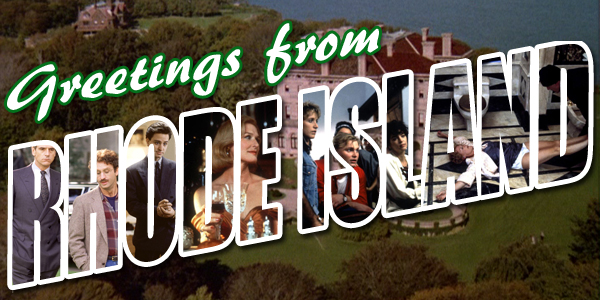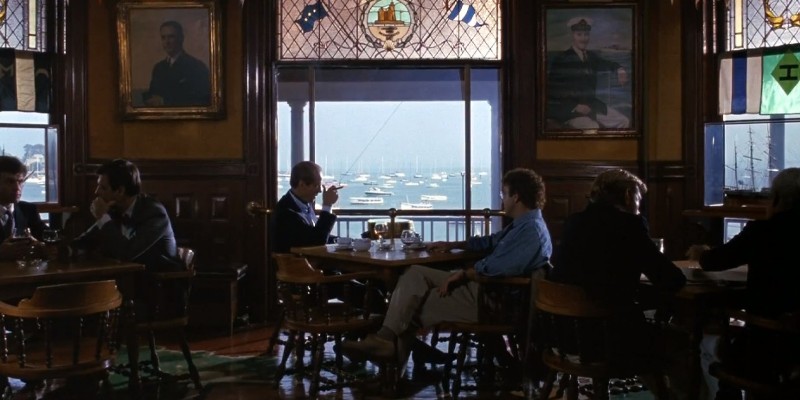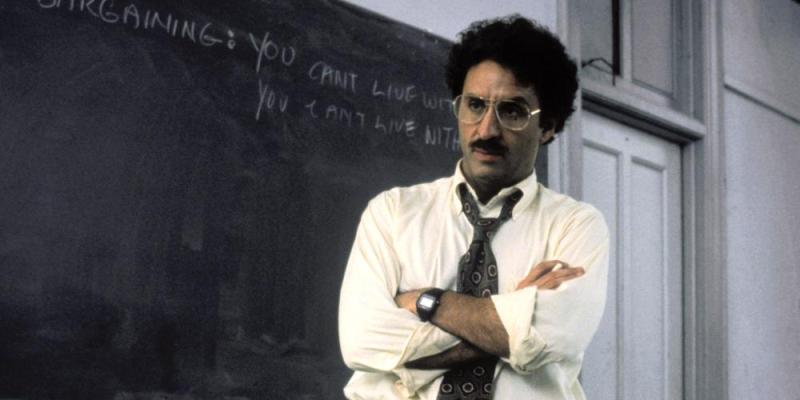
I’ve always wanted to travel across America. I’ve been a few times, to the major tourist attractions – Disneyworld in Florida, Vegas in Nevada, Cheers in Boston – but there’s so many places I’ve never seen in person, and most likely never will. Fortunately, there’s a solution, and it’s my own personal remedy to all life’s problems: movies. There’s been a movie set literally everywhere. Everywhere! So, this feature sees me cinematically visit a new state every week, through a film that was set there. You can read my journey so far here. Next up: Rhode Island!
Sunny von Bülow (Glenn Close) is in a coma, from which she will never wake. Her husband, the aristocratic European Claus von Bülow (Jeremy Irons) has been charged with her attempted murder, apparently using an insulin overdose, in order to inherit her vast wealth and move on with his life. Claus is released on bail, and hires small time lawyer Alan Dershowitz (Ron Silver) to make the case of his appeal plea, despite Dershowitz insistence that Claus is guilty, what with the mountain of evidence piled against him. He is given 45 days to assemble a team and build a case against Claus’ guilt, which proves more difficult than he’d ever thought.
I have a personal quest, where I’m going through all the films in the 1001 Movies You Must See Before You Die book. There’s no coincidence that most of the films I review for FTS are from said book, as if one can kill two birds with one stone, why not? This explains why for Rhode Island I’m not reviewing the likes of Hall Pass or The Sisterhood of the Travelling Pants 2, and have instead opted for a film I’d never even heard of, but appears on the List. When such an unfamiliar film is deemed List-worthy, my main focus during the viewing tends to be one question; why is this on the List? Of all the films in existence, why was this amongst the hallowed few selected as required viewing before we depart from our existence? Of course that’s the wrong way to go about any endeavour, but if there’s a wrong way to do something, chances are that’s the way I do it.

So why is Reversal of Fortune on the 1001 List? I’m not sure. It’s a solid drama, with mostly good and a couple of great performances and an interesting story, but there’s not a lot that sets it apart from pretty much every other lawyer/court case movie. That this was selected for the List over the likes of A Few Good Men boggles my mind, but then I just really like A Few Good Men, so perhaps I’m biased. It could be argued that Reversal of Fortune deserves its place because of the juxtaposing depiction of the upper crust von Bülows against the more everyman lawyers, which plays out in an unexpectedly light fashion, given the serious nature of the case.
Jeremy Irons is fantastic, in a role that would win him an Academy Award for Best Actor. He will never not be Scar in my ears, but no-one plays a snob like Irons. He has a way of removing syllables from words but still extending their length through elongated vowel sounds that is a dream to listen to. For example, where most people would say “Showered,” Irons’ Claus says “Shaaaaaaah’d.” I could listen to him all day, and would more than happily agree to him narrating every aspect of my life. He holds himself with poise and distinction, even when faced with the direst of circumstances, and it is the scenes he shares with Ron Silver and his team (including a young Felicity Huffman) that truly highlight how different his world is to theirs. When they all go out to a Chinese restaurant, Claus is very much out of his element, more used to the dishes remaining stationery on the table around him, or having the food portioned onto his plate by his dining staff, so he is unaccustomed to having to fight over the ever-mobile plate of ginger prawns, but is able to resolve the issue by just ordering his own plate.

Ron Silver is good as Dershowitz. He’s another actor with a terrific voice, which I first discovered in his role as Bruno Gianelli in The West Wing, and it was interesting seeing him play a scrappier, more resourceful lawyer here than he would later in life. Glenn Close is also used well as the comatose Sunny von Bülow, providing the film’s often ambiguous narration, and also revealing through flashbacks how frustrating Sunny was, opting to spend almost her entire life in bed surrounded by cigarettes, alcohol and a cornucopia of pharmaceuticals, occasionally throwing tantrums at her husband’s insistence on working despite her wealth. There’s a resigned acceptance to her narration; “I never woke from this coma, and I never will,” she states, matter-of-factly, as would someone who is aware of both their position and the futility of trying to escape it, yet it never feels morbid, as if she perhaps prefers this state of being to her previous one, or maybe she can’t even tell the difference.
There’s a decent selection of other recognisable faces amongst the case – Julie Hagerty is Claus’ mistress, Christine Baranski his new lover, Annabella Sciorra is Dershowitz’s former lover who he recruits for his team and Fisher Stevens is a slimeball witness with his own agenda – all of whom fulfil their roles well, but everyone is overshadowed by Irons. The scope of the film was unique too, opting not to solve the whole case, instead focussing on the aim of the appeal. It isn’t about uncovering every detail of the case, merely proving Claus’ point, one way or the other.

Whilst I disagree that this is essential viewing for everyone who is still alive, it’s still a worthwhile watch. Irons is fantastic, there’s some insights into a world most of us will never know (at a high class function, a tiger cub just appears, because that’s the kind of thing that occurs at these events) and the plot never gets less than interesting, despite lots of scenes of people sat in rooms discussing a court case and occasionally playing basketball.


